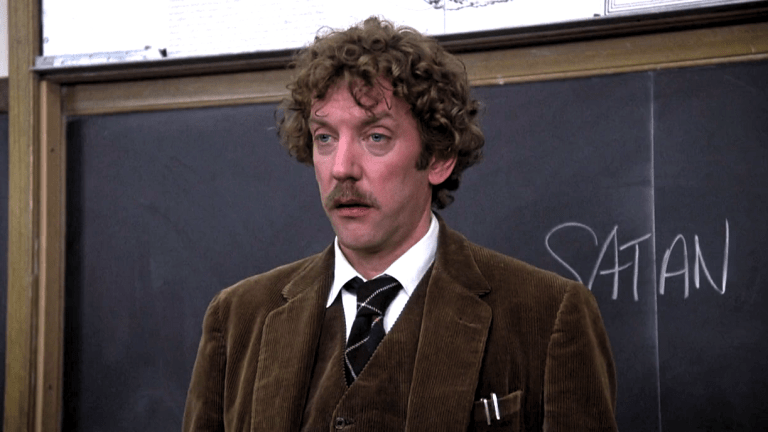How Donald Sutherland Made Animal House Possible and Lost Millions in the Process
Donald Sutherland was one of the most versatile actors of his generation who starred in many classics. Yet one of his big regrets was making Animal House happen and losing tens of millions for his efforts.

Tales of Hollywood actors turning down profit participation in huge hits are rampant, as when Orson Welles rejected the initial $75,000 plus 10 percent of the gross offer on 1949’s The Third Man for a quick $100,000 dollars up front. Not bad for only ten days’ work. Plus, he needed cash to finance Othello right away so it all worked out… except The Third Man would ultimately become one of the most financially successful movies of Welles’ career. He later regretted this, of course, and if the director of Citizen Kane wasn’t enough of a genius to go for points, then certainly the iconic, and yet strangely underappreciated, actor Donald Sutherland wasn’t immune to bad monetary decisions either.
Sutherland, who passed away yesterday at age 88 after a long illness, had an incredible career littered with enduring classics like M*A*S*H, Klute, and Best Picture winner Ordinary People to his resume. In his advanced years he even left an impact on modern franchise cinema by elevating The Hunger Games. We don’t imagine the Canadian thesp was hard up for cash with nearly 200 film and TV credits. Still, Sutherland, like Welles, nearly made a mint off his small role as a lackadaisical college professor in 1978’s college comedy touchstone, National Lampoon’s Animal House.
An irreverent story about warring fraternities at an early 1960s college campus, Animal House was almost never made because Universal president Ned Tanen hated the script. When producers Matty Simmons and Ivan Reitman convinced the studio they could make it for a paltry $3 million with Saturday Night Live star John Belushi in the lead, the studio still insisted they get a second big name involved. As it turns out, the film’s young director John Landis had made a fateful friend early in his career while working as a production assistant on the 1970 WWII flick Kelly’s Heroes.
“I spent nine months in Yugoslavia with Don, I babysat for Kiefer”” Landis said in a DGA interview, referring to Sutherland’s son/future actor Kiefer Sutherland. Landis eventually parlayed that friendship into a funny walk-on cameo for his 1977 hit The Kentucky Fried Movie where a fake trailer for a disaster movie called “That’s Armageddon” features “Donald Sutherland as The Clumsy Waiter” (complete with a three-second shot of Sutherland carrying a cake and tripping). The cameo was extra-hilarious considering Sutherland was one of the biggest stars in the world at the time. A year later, Animal House was almost happening at Universal.
Said Landis, “Ned Tanen said, ‘If you don’t get me one goddamn movie star, I’m not makin’ the picture.’ So I thought, well, the only movie star I know really well is Donald Sutherland. So I called Donald and I said, ‘I want you to be in Animal House,’ and he said, ‘What’s Animal House?’ I said, ‘It’s a movie for Universal.’ He said, ‘Well that’s MCA, I can’t do that for scale, you gotta pay me.’”
Thus began negotiations between Universal and Sutherland on a movie where both the director (Landis) and headlining star (Belushi) were only being paid $50,000 each. The most expensive player on the film was a horse/horse trainer combo who got paid $100,000. For the two days’ work of portraying Professor Dave Jennings—including one classroom scene, a scene where he smokes reefer with his students, and a scene where Peter Riegert’s Boon finds his girlfriend Katy (Karen Allen) post-coitus with Jennings—Sutherland initially asked Universal for $250,000 dollars (a hard no from MCA), then went down to around $50,000 dollars. The studio counter-offered $20,000 plus two percent of the picture’s back-end revenue. The actor had zero interest in becoming a profit participant.
“I told them, ‘No, you need to pay me my daily rate,’” Sutherland explained to Variety in 2014. “So I got $25,000 for the day, when I could have ended up with $14 million.” That final number is sometimes reported as $35,000 to $45,000.
Fortunately/unfortunately, that small role—little more than an extended cameo—which Sutherland did as a favor to a pal (while also shooting Invasion of the Body Snatchers in San Francisco) wound up being in one of the most successful comedies ever made. According to Business Insider, National Lampoon’s Animal House brought in $141 million at the box office (around $674 million adjusted for inflation) and still ranks as the 62nd highest-grossing R-rated movie of all time domestically (which does not count for inflation).
The actor suggests he lost $14 million by opting out of points on the movie while Landis thinks his pal could have earned as much as $20 million in late ‘70s dollars. In 2012, while appearing on The Opie and Anthony Show, Sutherland was bluntly asked, “Do you know what would two percent roughly have translated into?” The actor responded with a grin, “I don’t want to know.”
There is, of course, a silver lining to this. Not only did Sutherland most likely earn decent residuals on the very successful and perennially shown movie despite not having those juicy points, he was also singularly responsible for it being made at all. It’s been said that success is 90 percent showing up, and if Sutherland hadn’t shown up to Eugene, Oregon to shoot those few scenes—made up on the fly by screenwriter Doug Kenney specifically for the actor—then we would not have Belushi screaming “FOOD FIGHT!” We would not have Tim Matheson delivering his rousing “futile and stupid gesture” speech. And would The Isley Brothers’ “Shout” still be a karaoke/party staple today? Probably, but the movie helped. Animal House was inducted into the National Film Registry for preservation in 2001.
“Because he said yes, that’s why we got a greenlight,” Landis said. “All these actors who got their start with that film, from Kevin Bacon to Tom Hulce, owe him a huge debt.”
